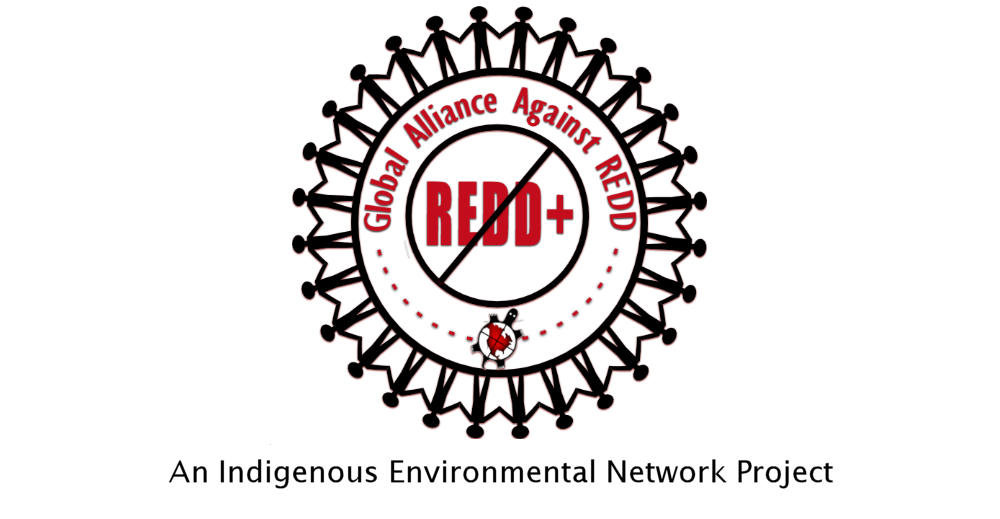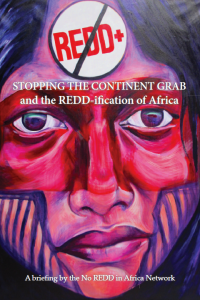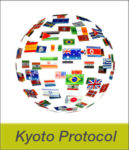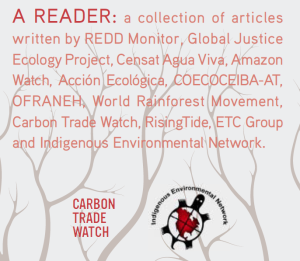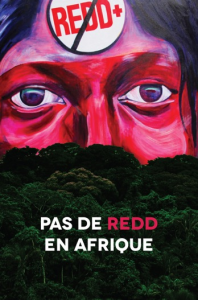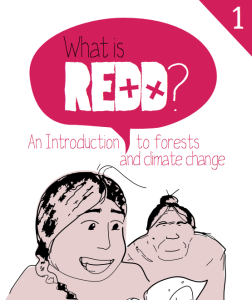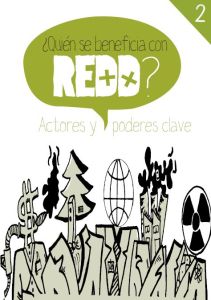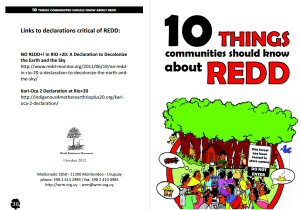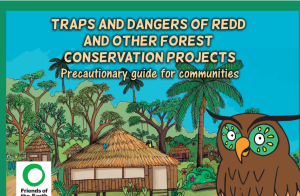Declarations
STOPPING THE CONTINENT GRAB and the REDD-ification of Africa
The worst form of slavery is to willingly offer yourself on the auction block, get bought and pretend you are free. This is what participation in the mechanism called Reducing Emissions from Deforestation and Forest Degradation (REDD) is. Coming at a time when climate action has shifted away from legally binding requirements to voluntary, “intended nationally determined contributions”, REDD provides a perfect space for polluters to keep polluting while claiming they are champions of climate action.
Indigenous Peoples and Climate Change:
Vulnerabilities, Adaptation, and Responses to Mechanisms of the Kyoto Protocol A Collection of Case Studies
Since the inception of the United Nations Framework Convention on Climate Change (UNFCCC) in 1992, Indigenous Peoples have sought to have a voice in a process that is certain to shape much of the future of the planet and all of its inhabitants. Indigenous Peoples have tried, so far with very limited success, to be an official and recognized part of these proceedings – not only because they are often particularly vulnerable to the effects of climate change, but also because they are significantly impacted by the decisions made and actions taken under the UNFCCC.
NO REDD – A READER
Acción Ecológica is a 25-year old Ecuadorian environmental organisation, whose principles are popular environmentalism, active non-violence and the rights of peoples and nature. Acción Ecológica works on the articulation of networks at local, national and international levels, as well as food and energy sovereignty. www.accionecologica.org
A Dozen of the Worst REDD-type Projects Affecting Indigenous Peoples and Local Communities
Chevron uses armed guards for a REDD-type project in Brazil. The Nature Conservancy, General Motors, American Electric Power, Society for Wildlife Research and Environmental Education, and Chevron (previously known as Texaco), infamous for destruction caused in Ecuadorian Amazon, have implemented the Guaraqueçaba Climate Action Project in the ancestral territory of Guarani People with uniformed armed guards called “Força Verde” or “Green Force” who intimidate and persecute local communities; jailing and shooting at people who go into the forest as well as forcibly entering and searching private homes without due authorization ii “…[T]he project has caused devastating impacts on the local communities…”iii
An Indigenous leader was criminalized for defending his people and territory from an Australian carbon cowboy who duped the Matsés People of the Peruvian Amazon into signing a REDD-type contract for perpetuity and written in English, which grants the carbon trader total control over the Matsés People’s land, way of life, intellectual property, forests and carbon. The contract also stipulates that anyone who denounces this scam will be sued.
PAS DE REDD EN AFRIQUE
La pire forme d’esclavage consiste à se vendre aux enchères de plein gré, de se faire acheter et ensuite de faire semblant d’être libre. C’est ce à quoi revient la participation à l’initiative des REDD (réduction des émissions issues du déboisement et de la dégradation des forêts). À un moment où l’action climatique a renoncé aux exigences obligatoires au profit de « contributions volontaires définies au plan national, » les REDD offrent un espace idéal pour les pollueurs de continuer à polluer tout en prétendant qu’ils sont des champions de l’action sur le climat.
What is REDD+
An Introduction to Forests and Climate Change
This booklet aims to decode REDD+ * which is a focus in the international climate change debates. It will explore key ideas behind the complexities of REDD+ which link lands, forests and climate change. Although there are many ways different communities understand this link, this booklet aims to introduce and problematize the terms that are used in the REDD+ debate.
Who Benefits from REDD – Players and Power
In most Southern countries, the history of colonization and imperialism has led to many conflicts around land uses and tenure. Forested lands are complex and contested spaces. A range of actors with contrasting values, interests and views on what to do with these lands compete for space and a voice in decision-making. Even though Indigenous Peoples, peasant communities and forest-dependent peoples hold ancestral ownership to their lands and forests decisions about who uses the lands are often imposed upon communities by powerful elites.
The Worst REDD-type projects in Africa: Continent Grab for Carbon Colonialism
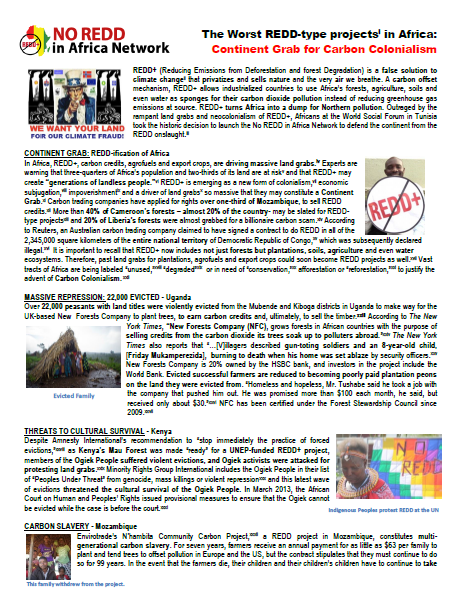
CONTINENT GRAB: REDD-ification of Africa
In Africa, REDD+, carbon credits, agrofuels and export crops, are driving massive land grabs.iv Experts are warning that three-quarters of Africa’s population and two-thirds of its land are at riskv and that REDD+ may create “generations of landless people.” REDD+ is emerging as a new form of colonialism, economic subjugation,viii impoverishment and a driver of land grabs so massive that they may constitute a Continent Grab. Carbon trading companies have applied for rights over one-third of Mozambique, to sell REDD credits. More than 40% of Cameroon’s forests – almost 20% of the country- may be slated for REDD-type projects and 20% of Liberia’s forests were almost grabbed for a billionaire carbon scam. According to Reuters, an Australian carbon trading company claimed to have signed a contract to do REDD in all of the 2,345,000 square kilometers of the entire national territory of Democratic Republic of Congo, which was subsequently declared illegal. It is important to recall that REDD+ now includes not just forests but plantations, soils, agriculture and even water ecosystems. Therefore, past land grabs for plantations, agrofuels and export crops could soon become REDD projects as well. Vast tracts of Africa are being labeled “unused,”xviii “degraded” or in need of “conservation,” afforestation or “reforestation,” to justify the advent of Carbon Colonialism.
Click Here to Open/Read/Download – PDF
10 Things Communities Should Know About REDD
In the REDD projects already underway, we always see how a small group of people manage to benefit from the project. These include, for example, big NGOs, government technicians and consultants. They are responsible for the coordination of the project and the “technical” aspects, such as verifying if deforestation was, in fact, prevented. Many of them can enter the community’s territory whenever they want. Polluting companies also benefit when they finance a REDD project because they can continue to produce carbon emissions, or produce even more, and say that they have earned this “right” because they are preserving forests, and the environment, but somewhere else.
Traps and Dangers of REDD and Other Forest Conservation Projects
For some years now, forests and fields are full of lawyers and businessmen offering deals with
communities to include their territories in projects of forest conservation or REDD (Reducing Emissions from Deforestation and Forest Degradation).
These proposals are being promoted as something new and original, when in fact, they are not. There are many precedents of projects that propose to “pay to conserve”, based on the opinion of economists who argue that the only way to value the forest is by setting a price for it. Consequently, they directly ignore a series of non-monetary values that exist for millions of people who live in the forests; these values are rooted in cultural, spiritual and traditional uses, and they inspire communities to love, respect and protect their territories.
An Indigenous Peoples’ Guide: False Solutions to Climate Change
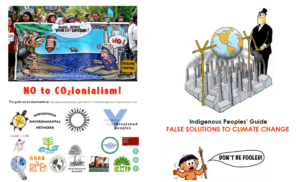 The Carbon Market buys and sells permits to pollute called ”carbon credits”. It claims to solve the climate crisis but really just allows polluters to buy their way out of reducing their emissions. This multibillion-dollar pollution trading mechanism privatizes the air and commodifies the atmosphere. The International Indigenous Peoples’ Forum on Climate Change opposes the carbon market. “We cannot condone activities that def ile the sac redness of Mother Earth…Carbon trade-induced conflicts…endanger our survival…”
The Carbon Market buys and sells permits to pollute called ”carbon credits”. It claims to solve the climate crisis but really just allows polluters to buy their way out of reducing their emissions. This multibillion-dollar pollution trading mechanism privatizes the air and commodifies the atmosphere. The International Indigenous Peoples’ Forum on Climate Change opposes the carbon market. “We cannot condone activities that def ile the sac redness of Mother Earth…Carbon trade-induced conflicts…endanger our survival…”
Northern polluters can also get permits to pollute through projects in the South like a dam or a tree plantation under the Clean Development Mechanism (CDM). The International Indigenous Peoples’ Forum on Climate Change calls the CDM “a new form of colonial ism.” Permits to pollute could also soon be generated by promising not to cut down forests and plantations that
absorb pollution.
Click Here to Open/Read/Download – PDF
Reaping Profits from Evictions, land grabs, Deforestation and Destruction of Biodiversity
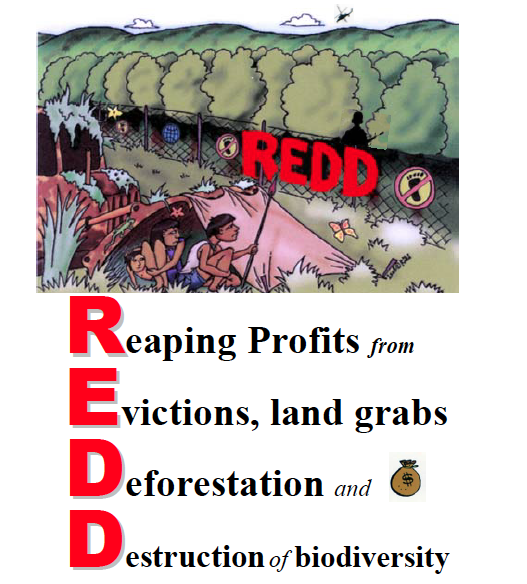
There are hundreds of REDD-type pilot projects in the world and, as this booklet shows, many of them violate Indigenous Peoples’ rights and have resulted in militarization, evictions, fraud, disputes, conflicts, corruption, coercion, conmen, crime, plantations and 30-100 year contracts, deals with oil companies and other climate criminals. Furthermore, economic speculation with carbon credits from REDD may contribute to the next market crash and Indigenous Peoples could lose out if their “benefits” are subject to the volatile price of carbon. Lastly, Indigenous Peoples could be held liable if REDD projects fail due to natural ecological or climate change-related disasters such as floods, droughts, forest fires, storms, pests or plagues.
